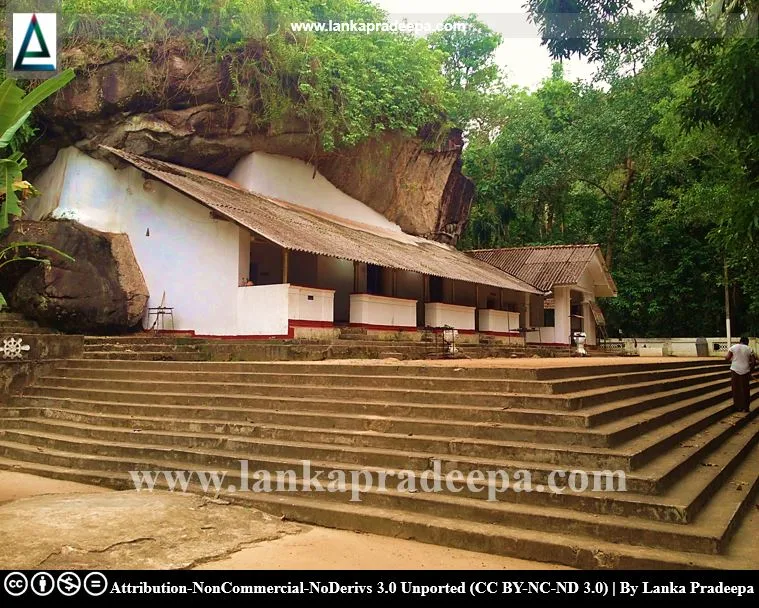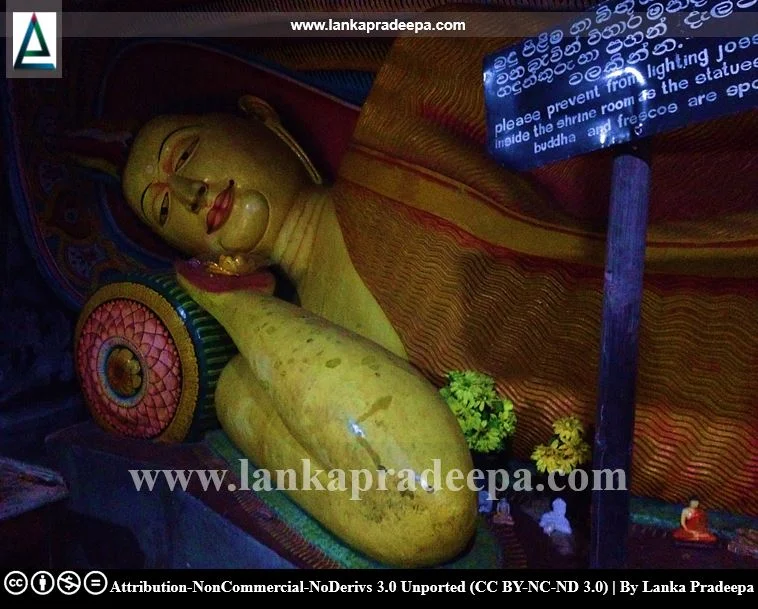
|
Warakagoda Gallen Raja Maha Viharaya |
Warakagoda Gallen Raja Maha Viharaya, also known as Gallena Purana Raja Maha Viharaya (Sinhala: වරකාගොඩ ගල්ලෙන් රජමහා විහාරය), is Buddhist cave temple situated in Warakagoda village in Kalutara District, Sri Lanka.
History
Local chronicles connect the history of this temple with the details about the fortress of Pasyodun Rata. It is believed that this temple was erected by three brothers; Manabharana, Keerthi Sri Megha, and Sri Wallabha when they were occupying the fortress at Pasyodun Rata. The Pancayojana-Rattha or Pasyodun-vaga (present Pasdun Korale) was a part of Rohana principality before King Parakramabahu’s (1153-1186 A.D.) rulership of Dakkhinadesa in the 12th century.
The Galapatha Inscription of King Parakramabahu II (1236-1270 A.D.) of Dambadeniya is said to have helped in the identification of this temple (Abeyawardana, 2002). The 18 cubit reclining Buddha image which is accommodated in the main cave is attributed to Manabharana (Abeyawardana, 2002). The image was originally made of clay and later (about in 1800 A.D.) had been repaired using a lime mortar (Abeyawardana, 2002). The murals of the present cave temple were done in 1946 by the Karannagoda Samagiwardana Society (Abeyawardana, 2002).
The Cave Temple
The cave temple which is the main attraction of the temple consists two parts; the inner shrine and the outer shrine. The inner shrine is said to be the oldest of the two (De Silva & Chandrasekara, 2009). A long rock-cut drip-ledge on the brow of the cave prevent the rainwater from dripping inside the shrines. The walls of the cave have been plastered with a layer of clay.
A Protected Site
The ancient cave and the Devalaya chamber in the temple premises and the drip-ledged cave situated in the land adjoins Warakagoda Gallena Purana Rajamaha Vihara belonging to Warakagoda situated in Grama Niladhari Division, No. 816B, Warakagoda North in the Divisional Secretary’s Division of Madurawala are archaeological protected monuments, declared by the government Gazette notifications published on 22 November 2002 and 9 March 2016.




Related Posts
Read Also
References
Books, Government Gazette Notifications
1) Abeyawardana, H.A.P., 2002. Heritage of Sabaragamuwa: Major natural, cultural and historic sites. Colombo: The Central Bank of Sri Lanka. p.112.
2) De Silva, N.; Chandrasekara, D.P., 2009. Heritage Buildings of Sri Lanka. Colombo: The National Trust Sri Lanka. ISBN: 978-955-0093-01-4. p.77.
3) The Gazette of the Democratic Socialist Republic of Sri Lanka, no: 1264, 22 November 2002.
4) The Gazette of the Democratic Socialist Republic of Sri Lanka: Extraordinary. No: 1957/18. 9 March 2016. p.5A.
Location Map
Dynamic Google Map
වරකාගොඩ ගල්ලෙන් රජමහා විහාරය
වරකාගොඩ ගල්ලෙන් රජමහා විහාරය ශ්රී ලංකාවේ කළුතර දිස්ත්රික්කයේ වරකගොඩ පිහිටි බෞද්ධ සිද්ධස්ථානයකි.
ඉතිහාසය
දේශීය වංශකතා මූලාශ්ර විසින් මෙම විහාරයෙහි ඉතිහාසය පස්යොදුන් රට පැරණි බලකොටුව සමග සම්බන්ධ කෙරේ. මානාබරණ, කීර්ති ශ්රී මේඝ, හා ශ්රී වල්ලභ යන තුන්බෑ සොහොයුරන් පස්යොදුන් රට බලකොටුවෙහි කඳවුරු බැඳ සිටින සමයෙහි මෙම විහාරය ඉදිකරන්නට ඇතැයි සැළකේ. 12වන සියවසේ පරාක්රමබාහු විසින් දක්ඛිණ දේශය පාලනයට පෙර පස්යොදුන් රට යනු රෝහණ රාජ්යයට අයත් කොටසක් විය.
2වන පරාක්රමබාහු රජුගේ ගලපාත විහාර සෙල්ලිපිය මෙම විහාරය හඳුනාගැනීම පිණිස ප්රයෝජනවත් වූ බව පැවසේ. ප්රධාන ලෙනෙහි වූ රියන් 18 සැතපෙන බුද්ධ ප්රතිමාව මානාබරණ විසින් ඉදිකරන්නට ඇතැයි සැළකේ. මුල්සමයේ මැටියෙන් ඉදිකොට තිබූ ප්රතිමාව ක්රි.ව. 1800 න් පසු එහි ආරක්ෂාව උදෙසා නැවත හුණු පිරියමින් පිළිසකර කොට තිබේ.
ලෙන් විහාරය
වරකාගොඩ පන්සලේ ලෙන් විහාරය ඇතුල් කොටස හා පිට කොටස යනුවෙන් කොටස් දෙකකින් සමන්විත වේ. මින් ඇතුල් කොටස ලෙන් විහාරයේ පැරණිතම කොටස වශයෙන් සැළකෙයි. ලෙන තුලට ජලය ගලා ඒම වළක්වා ගැනීම පිණිස ලෙනෙහි පියස්සේ ගලෙහි කපන ලද කටාරම් වේ. ඇතුලත ලෙන් බිත්ති මැටි බදාමයෙන් ආවරණය කර ඇති අතර ලෙන් විහාරයෙහි දැකගත හැකි වත්මන් බිතුසිතුවම් කරන්නාගොඩ සමගිවර්ධන සමිතිය විසින් 1946 වර්ෂයේදී නිමවා තිබේ.
පුරාවිද්යා ස්මාරක ස්ථානය
මදුරාවෙල ප්රාදේශීය ලේකම් කොට්ඨාශයේ අංක 816 B වරකාගොඩ උතුර ග්රාම නිළදාරී වසමට අයත් වරකාගොඩ ගල්ලෙන පුරාණ විහාර පරිශ්රයෙහි වූ පැරණි ලෙන හා දේවාලයද, විහාර පරිශ්රයට යාබද ඉඩමෙහි වූ කටාරම් කෙටූ ලෙන 2002 නොවැම්බර් 22වන දින හා 2016 මාර්තු 9වන දින ප්රකාශයට පත් රජයේ ගැසට් නිවේදන මගින් ආරක්ෂිත පුරාවිද්යා ස්මාරක ලෙස නම් කොට ඇත.

